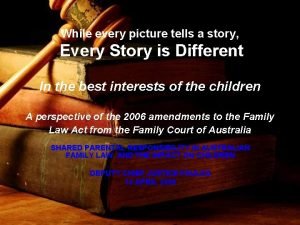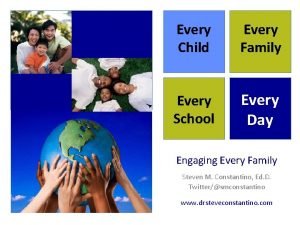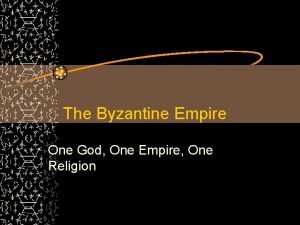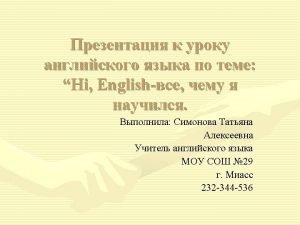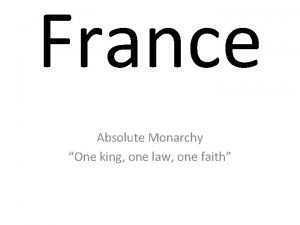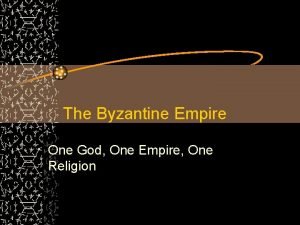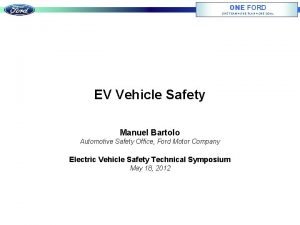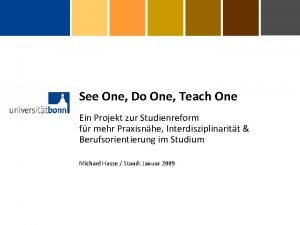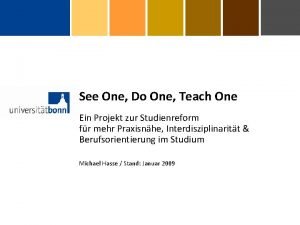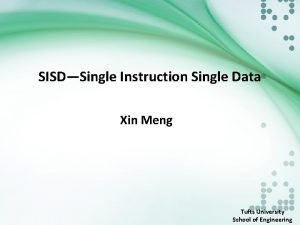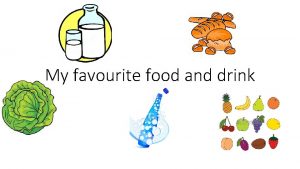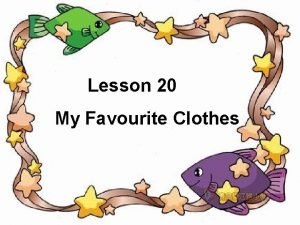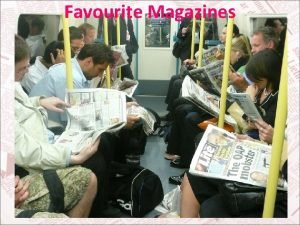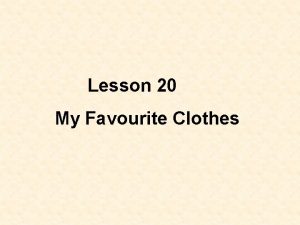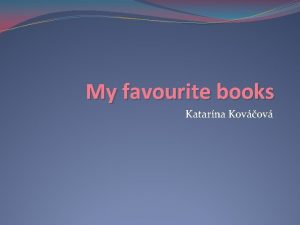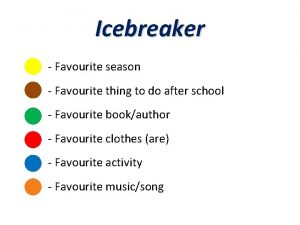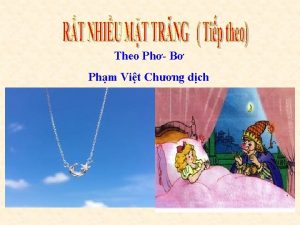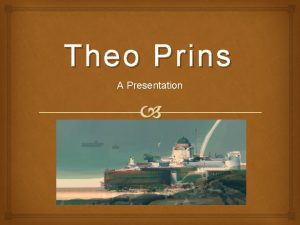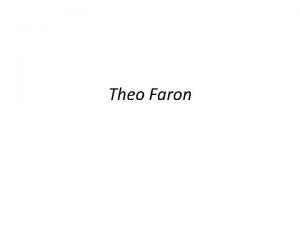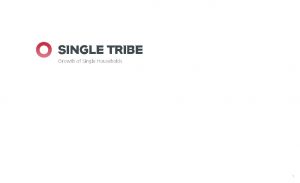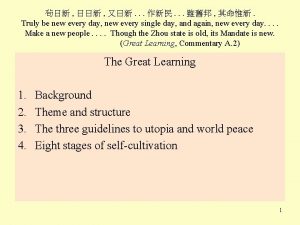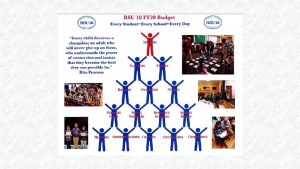Every single one is my favourite Theo 4










![“I got it!” [Stella, 3 years]: Becoming tech savvy Stella (3 years): Where is “I got it!” [Stella, 3 years]: Becoming tech savvy Stella (3 years): Where is](https://slidetodoc.com/presentation_image/63413fe47a68c1ea0094ef5b32e70884/image-11.jpg)










- Slides: 21

“Every single one is my favourite” (Theo, 4 years): Children’s Experiences and Perceptions of E-Book Reading Lynne (E. F. ) Mc. Kechnie Kathleen Schreurs University of Western Ontario OCLC/ALISE LIS Research Grant Program ALISE January 2015

Introduction • About 70 billion apps available for download with more than 80% of the top selling ones targeted at children (Shuker, Levine & Ree, 2012) • Percentage of children who have read an e-book increased from 25% to 61% since 2010 (Scholastic. Kids & Family Reading report, 5 th ed. , 2015) • 77% of children who have read an e-book said most of the books they read are print and 65% report they will still read print books even when e -books are available (Scholastic, 2015)

Literature search • Broad surveys on the production and sales of e -books and children’s e-book reading habits • Growing body of work that focuses on ebooks, literacy and education • LIS literature has looked at digital libraries for children, classification of e-books, user interface design and building collections • Almost all of this literature is adult-centric and very little explores reading for pleasure

This study sought to explore. . . the experience of e-book reading from the perspectives of the children themselves

Method • Contextual inquiry (Beyer & Holtzblatt, 1998) • Observation and interviews with data captured through field notes and audio-recording • Convenience and purposeful sampling • n = 20 children from 2 – 12 years • Analysis - Ground theory (Corbin & Strauss, 2008)

Data collection

Pat the Bunny Book trailer, Random House Children’s Books, accessed January 26, 2015. https: //www. youtube. com/watch? v=v. BUa 97 Z-JZo

Findings • Most of the children regarded their device first as a gaming space • These kids were all tech savvy • Becoming tech / e-book savvy • Traditional books are still important • E-books and book apps went beyond the book

“Wait a minute. . . E-books also have games? ” (Suzanne, 8 years): Device as gaming space • ON: Eva (mother of Marietta, 3 years) opens Pixel and Parker (interactive e-book). ON: Marietta closes Pixel and Parker and opens a game. • Mom: No movies Rapunzel (3 years)! Rapunzel: Please Mama, please. • When asked what he uses his i. Pad for, Jake (12 years) responds: “Well, I play games. I have lots of games on it. I used to watch hockey on it. And I probably watch videos on it too. ”

“My first time I knew it before I even learned it. ” (Hero, 8 years): Tech savvy • ON: Mom asks Olivia (2 years)to turn the volume down and she does. Lynne: Oh, you know how to turn the volume down. That’s really good Olivia.
![I got it Stella 3 years Becoming tech savvy Stella 3 years Where is “I got it!” [Stella, 3 years]: Becoming tech savvy Stella (3 years): Where is](https://slidetodoc.com/presentation_image/63413fe47a68c1ea0094ef5b32e70884/image-11.jpg)
“I got it!” [Stella, 3 years]: Becoming tech savvy Stella (3 years): Where is the airplane? Mom: There it is. Stella: [Touching cloud again. Plane appears. Sounding very pleased with herself] I got it! ON: Stella touches word after word and the book app reads the words aloud. Stella has learned to do this very quickly (in a minute or two in front of me). TN: Stella is remarkably independent using this book app. She knows the basic functions like how to turn a page, tapping images and that the words turn red in colour as they are read.

1. Becoming tech savvy: Shared reading • ON: Lianne (6 years) instructs her sister (Silvia, 4 years)on what to do by showing her with her own finger. Or pointing to the correct application.

2. Becoming tech savvy: Exploring apps • ON: Catherine (2 years) presses all the options to make sounds. Presses all areas of the screen to see what makes sounds or produces animation. . . [Later] Begins e-book again. Goes through the pages much faster now that she knows what to press and what makes sounds and animations.

3. Becoming tech savvy: Transferability of skills • “Houses or anything like that. . . House is always home. Of course. ” (Hero, 8 years) • Joel (8 years): [Reading/playing Don’t Let the Pigeon Run This App!] Ahh, this is where you yell “NO!” TN: Transfer of print reading skills to e-reading contexts.

4. Becoming tech savvy: Apps structured to teach the tech • ON/TN: [Referring to Elsa 1’s (6 years) reading of Pat the Bunny] In fact this book app provides child friendly icons (all images, no text which requires reading) and verbal instructions about how to play. It also suggests repeats – “Do you want to play again? ” – and feedback – “You did it!” – which reinforces the learning. This is an exceptional example of how an app itself can be designed so as to make how it works transparent to even very young children.

“That one smells. ”(Stella, 3 years): Traditional print books • “It’s like the Captain Underpants books. Like you can use your thumb and landscape through the pages and make it look like it’s moving. You can’t do that on an i. Pad. ” (Jake, 12 years) • “It just doesn’t need electricity. It’s better for the environment. ” (Hero, 8 years)

“You don’t have to read them. They read themselves to you. ” (Joel, 8 years): Beyond the book • “That you can press the animals and they do stuff and say stuff. ” (Theo, 4 years) • “I like e-books because they light up. They are different from paper books because they have lights and the i. Pad lights. ” (Jayne, 6 years) • [Whispering in Mom’s ear] “Because they can speak. ” (Elsa 1, 6 years) • “You don’t need a bookshelf. ” (Sarah, 11 years) • “Because they are most fun. ” (Lydia, 4 years) • “I want to turn this one off. ” (Stella, 3 years)

But, a book is a book. . . • “I like reading paper books better because when you press the screen it turns the pages. That is why I like paper books better on the i. Pad. ” (Lianne, 6 years) • Wolfman (8 years): [When asked if he prefers print or e-books] I read practically the same.

Conclusions • The children loved e-books • The importance of public libraries in developing strong e-book collections for children, enabling access to them and educating parents and other adults • Voluntary free e-reading

What’s next? Dissemination of results LISR, Children and Libraries, OLA, SHARP Further research drawing on these results • Case study of Stella (3 years) • Case study of Goodnight Moon • Selection criteria and collection development practices which account for children’s experiences and perspectives Further research • Political economy of e-book production and distribution

References Beyer, H. , and Holtzblatt, K. (1998). Contextual design: Defining customer-centered systems. San Francisco, CA: Morgan Kaufman Publishers. Corbin, J. , and Strauss. (2008). A. Basics of qualitative research: Techniques and procedures for developing grounded theory, 3 rd ed. Thousand Oaks, CA: Sage. Scholastic. (2015). Kids and family reading report, 5 th ed. Shuler, C. , Levine, Z, & Ree, J. (2012). i. Learn II: An analysis of the educational category of Apple’s app store. In New York: The Joan Ganz Cooney Center of Sesame Workshops.
 Every nation and every country has its
Every nation and every country has its Microsoft mission statement
Microsoft mission statement Every knee shall bow every tongue confess
Every knee shall bow every tongue confess Every rotarian every year
Every rotarian every year Every nation and every country
Every nation and every country Every picture has a story and every story has a moment
Every picture has a story and every story has a moment Every child every day
Every child every day One god one empire one emperor
One god one empire one emperor Little dog run
Little dog run One king one law one faith
One king one law one faith One god one empire one emperor
One god one empire one emperor Ford one plan
Ford one plan See one do one teach one
See one do one teach one See one, do one, teach one
See one, do one, teach one One face one voice one habit and two persons
One face one voice one habit and two persons Studiendekanat uni bonn
Studiendekanat uni bonn One vision one identity one community
One vision one identity one community Graphic organizer with the aims of la liga filipina
Graphic organizer with the aims of la liga filipina Multiple instruction single data example
Multiple instruction single data example Dataxin
Dataxin Waiting line management
Waiting line management What is your favourite destination
What is your favourite destination





